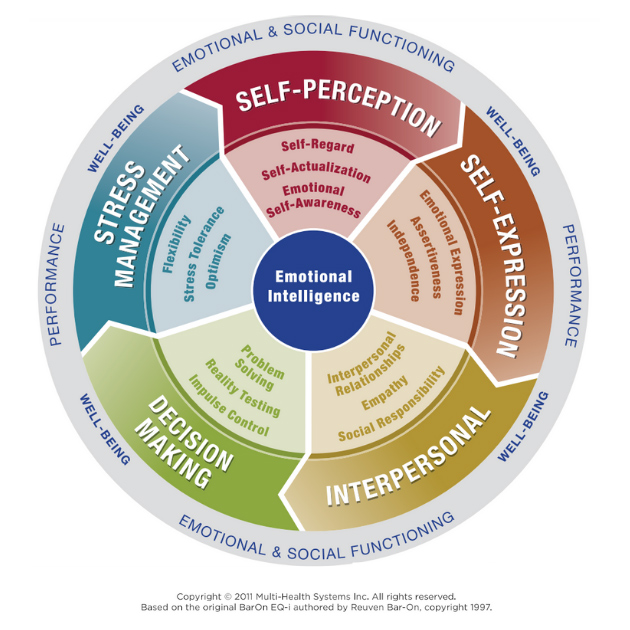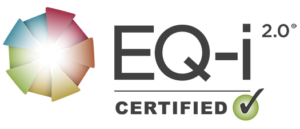EQ-i®
Emotional Intelligence (EI) is a set of emotional and social skills that influence the way we perceive and express ourselves, develop and maintain social relationships, cope with challenges, and use emotional information in an effective and meaningful way.
Emotional Intelligence is proven to be a key indicator of human performance and development. People higher in EI communicate effectively, form strong relationships, and create powerful coping strategies. EI can be measured – more accessibly and less controversially than IQ – and unlike IQ, it can be substantially strengthened and developed.
SELF-PERCEPTION
Self-Regard is respecting oneself while understanding and accepting one’s strengths and weaknesses. Self-Regard is often associated with feelings of inner strength and self-confidence.
Self-Actualization is the willingness to persistently try to improve oneself and engage in the pursuit of personally relevant and meaningful objectives that lead to a rich and enjoyable life.
Emotional Self-Awareness includes recognizing and understanding one’s own emotions. This includes the ability to differentiate between subtleties in one’s own emotions while understanding the cause of these emotions and the impact they have on one’s own thoughts and actions and those of others.
SELF-EXPRESSION
Emotional Expression is openly expressing one’s feelings verbally and nonverbally.
Assertiveness involves communicating feelings, beliefs and thoughts openly, and defending personal rights and values in a socially acceptable, non-offensive, and non-destructive manner.
Independence is the ability to be self directed and free from emotional dependency on others. Decision-making, planning, and daily tasks are completed autonomously.
INTERPERSONAL
Interpersonal Relationships refers to the skill of developing and maintaining mutually satisfying relationships that are characterized by trust and compassion.
Empathy is recognizing, understanding, and appreciating how other people feel. Empathy involves being able to articulate your understanding of another’s perspective and behaving in a way that respects others’ feelings.
Social Responsibility is willingly contributing to society, to one’s social groups, and generally to the welfare of others. Social Responsibility involves acting responsibly, having social consciousness, and showing concern for the greater community.
DECISION MAKING
Problem Solving is the ability to find solutions to problems in situations where emotions are involved. Problem solving includes the ability to understand how emotions impact decision making.
Reality Testing is the capacity to remain objective by seeing things as they really are. This capacity involves recognizing when emotions or personal bias can cause one to be less objective.
Impulse Control is the ability to resist or delay an impulse, drive or temptation to act and involves avoiding rash behaviors and decision making.
STRESS MANAGEMENT
Flexibility is adapting emotions, thoughts and behaviors to unfamiliar, unpredictable, and dynamic circumstances or ideas.
Stress Tolerance involves coping with stressful or difficult situations and believing that one can manage or influence situations in a positive manner.
Optimism is an indicator of one’s positive attitude and outlook on life. It involves remaining hopeful and resilient, despite occasional setbacks.
How Is Leadership Affected By EQ?
EQ-i Leadership Report
Every company has experienced instances where a leader within the organization shows strengths in core competencies necessary for the role, but may be exhibiting EI blind spots of which peers are taking notice. Or, a company finds an employee that exhibits great work ethic and is an emerging star amongst his/her peers, while showing comparable traits to leaders within the organization. In both scenarios, the Leadership Report can be used when honing in on leadership development, executive development and coaching, and developing high potential leaders.
The Leadership Report examines results through four key dimensions: Authenticity, Coaching, Insight, and Innovation. The report also contains insights on the possible implications of results, and which skills have the highest potential of becoming leadership derailers. Strategies for development will be provided with the aim to attain true leadership potential, while being able to compare results against top leaders as a benchmark.
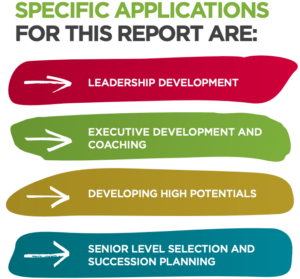
How Can EI Help My Employees Manage Their Careers?
EQ-i Workplace Report
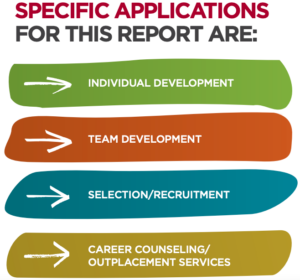
Every company has experienced instances where a leader within the organization shows strengths in core competencies necessary for the role, but may be exhibiting EI blind spots of which peers are taking notice. Or, a company finds an employee that exhibits great work ethic and is an emerging star amongst his/her peers, while showing comparable traits to leaders within the organization. In both scenarios, the Leadership Report can be used when honing in on leadership development, executive development and coaching, and developing high potential leaders.
The Leadership Report examines results through four key dimensions: Authenticity, Coaching, Insight, and Innovation. The report also contains insights on the possible implications of results, and which skills have the highest potential of becoming leadership derailers. Strategies for development will be provided with the aim to attain true leadership potential, while being able to compare results against top leaders as a benchmark.
Regardless of whether a group works harmoniously with great collaboration and cohesion, or finds itself with conflicting opinions and strategies that can affect the balance of a group, this report can be used when looking for deeper insights into a group’s strengths as well as areas where the group can be more effective.
Implications at an organizational level can be examined and strategies for action can further develop the group’s potential. The EQ-i 2.0 Group Report combines the scores of individuals that take the assessment in a manner that enables interpretation at a group or team level.
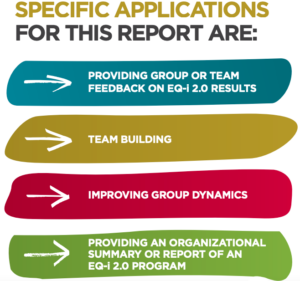
Return On Investment (ROI)
Emotional Intelligence assessments are an inexpensive, simple and very effective way to impact leadership development.
60% of those who use Emotional Intelligence assessments say they are effective or very effective. Equally efficient methods of development include executive coaching, job rotations, and global assignments.
Incorporating Emotional Intelligence as part of leadership coaching supports higher performance.
When organizations incorporate Emotional Intelligence in leadership coaching, they are 36% more likely to report effective EI performance.
Content on this page provided by MHS Assessments.

